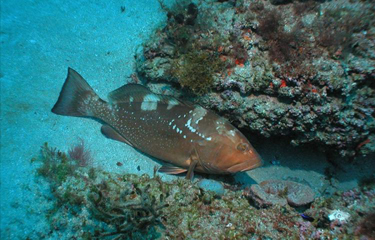Gulf of Mexico commercial-fishing groups have filed suit against the U.S. government, alleging a reallocation of red grouper catch shares illegally favors the recreational-fishing sector.
The lawsuit, filed Friday, 6 May, challenges the National Marine Fisheries Service’s implementation of Amendment 53, which was announced on Monday, 2 May and which is set to come into effect 1 June, 2022. The new rule amends the fishery management plan for reef fish resources in the Gulf of Mexico so that the allocation of the red grouper catch to the commercial sector is lowered from 76 percent to 59.3 percent, while increasing the recreational catch-share from 24 percent to 40.7 percent.
“In approving Amendment 53 … NMFS acted arbitrarily, capriciously, and in violation of law, abused its discretion, and acted without observance of procedure required by law,” the lawsuit said.
Filed by the Cortez, Florida, U.S.A.-based A.P. Bell Fish Company, the Southern Offshore Fishing Association, and the Gulf of Mexico Reef Fish Shareholders’ Alliance against NMFS, NOAA, and U.S. Commerce Secretary Gina Raimondo, who oversees NOAA and NMFS, the lawsuit cites problems with the data used by NMFS in calculating the redistribution rates for the catch limits and argues the commercial sector is being punished for the high rate of dead discards created by recreational fishermen.
“This case is about the government’s allocation of fishing privileges for catching red grouper in the Gulf of Mexico between two user groups. The challenged agency action takes fish away from the commercial fishing sector, and gives them to the recreational fishing sector. But the recreational sector is wasteful, catching and throwing back millions of red grouper each year, of which hundreds of thousands die,” it said. “Allocating more fish to the recreational sector will increase this waste, reduce the amount of fish available for consumption, and increase the risk of overfishing the stock. These outcomes are unlawful.”
The plaintiffs questioned NFMS’ use of data in its reallocation decision, alleging that because recreational landings and discard data are self-reported, they are “highly uncertain, difficult to validate, and thus unreliable.”
“Amendment 53 repeatedly acknowledges that allocating a larger percentage of the total [catch limit] to the recreational sector will therefore increase management uncertainty and risk of overfishing,” it said.
Additionally, Amendment 53 sets a lower red grouper catch limit for both the commercial and recreational sectors to account for mortality associated with increased recreational-sector bycatch, which is estimated to kill around 430,000 red grouper annually, according to the suit.
“The commercial sector is therefore forced to fish under a catch limit that is reduced to account for increased dead discards resulting from reallocation of quota to the recreational sector,” it said. “In effect, Amendment 53 forces the commercial sector to subsidize dead discards in the recreational sector.”
The recreational sector is not required to obtain a federal permit and all of its data-collection efforts are voluntary. In contrast, the 400 or so active users of commercial red grouper permits are “subject to strict accountability measures to ensure that the commercial-sector [catch limit] is not exceeded.”
“Commercial vessels must have vessel monitoring systems that report their location to NMFS, they must have sufficient [quota] allocation in their online vessel accounts to cover their landings, they must inform NMFS where and when they will offload their catch each time they return from a fishing trip, and they must sell their landings to a licensed fish dealer. Each pound of fish landed is tracked and accounted for in real-time. Commercial vessels must also maintain logbooks in which they record landings and other information from their fishing trips. Approximately 20 percent of vessels must also fill out mandatory supplemental logbook reports to report the number and species of any fish discarded atsea. Commercial vessels must also carry human observers when required by NMFS that record what is caught, kept and discarded at sea,” the lawsuit said.
The commercial sector is complying with efforts to ensure the sustainability of the red grouper population in Florida, while the recreational sector “undermines achievement of conservation requirements and goals of the fishery management policy,” the lawsuit said.
“These outcomes are the opposite of what Congress intended when it adopted the Magnuson-Stevens Fishery Conservation and Management Act,” it said.
This is particularly alarming, the lawsuit said, since the stock of red grouper in the Gulf of Mexico was subject to overfishing and declared overfished in October 2000. While NMFS enacted a plan to rebuild the stock by 2014, its population has still not reached the agency’s target level. A 2019 stock assessment concluded that the stock is no longer considered overfished or subject to overfishing, but the stock is still not at fully healthy levels, the lawsuit warned.
“The stock is not presently considered overfished because NMFS recently lowered the benchmark at which the stock would be considered overfished. Based on the previous benchmark, the stock would still be considered overfished,” it said. “In real terms, based on data through 2017 used for the latest stock assessment completed in 2019, stock abundance is the lowest on record.”
The lawsuit, filed in the U.S. District Court for the District of Columbia, asks that Amendment 53 be found in violation of the Magnuson-Stevens Fishery Conservation and Management Act, the Administrative Procedure Act, and the National Environmental Policy Act. Furthermore, it asks that Amendment 53 be vacated and that NMFS revert to the prior allocation and accounting for red grouper catch limits, that it take further action to ensure the recreational sector adheres to its codified catch limits, and that it ensure that NMFS uses "the best available scientific information" to monitor the recreational sector's fishing impact.
Photo courtesy of NOAA







